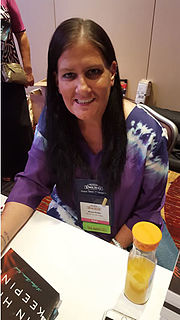A Quote by William Goldman
The first morning after Westley's departure, Buttercup thought she was entitled to do nothing more than sit around moping and feeling sorry for herself. After all, the love of her life had fled, life had no meaning, how could you face the future, et cetera, et cetera.
Related Quotes
Yet there were times when he did love her with all the kindness she demanded, and how was she to know what were those times? Alone she raged against his cheerfulness and put herself at the mercy of her own love and longed to be free of it because it made her less than he and dependent on him. But how could she be free of chains she had put upon herself? Her soul was all tempest. The dreams she had once had of her life were dead. She was in prison in the house. And yet who was her jailer except herself?
Westley: Hear this now: I will always come for you. Buttercup: But how can you be sure? Westley: This is true love-you think this happens every day? Westley: I told you I would always come for you. Why didn't you wait for me? Buttercup: Well...you were dead. Westley: Death cannot stop true love. All it can do is delay it for a while. Buttercup: i will never doubt again. Westley: There will never be a need.
although she went home that night feeling happier than she had ever been in her short life, she did not confuse the golf course party with a good party, and she did not tell herself she had a pleasant time. it had been, she felt, a dumb event preceded by excellent invitations. what frankie did that was unusual was to imagine herself in control. the drinks, the clothes, the instructions, the food (there had been none), the location, everything. she asked herself: if i were in charge, how could i have done it better?
Her future, she thought, was likely to be worse than her past, for after her years of contented renunciation, she had slipped back into desire and longing; she found joyless days of distasteful occupation harder and harder; she found the image of the intense and varied life she yearned for, and despaired of, becoming more and more importunate.
How was it that he haunted her imagination so persistently? What could it be? Why did she care for what he thought, in spite of all her pride in spite of herself? She believed that she could have borne the sense of Almighty displeasure, because He knew all, and could read her penitence, and hear her cries for help in time to come. But Mr.Thornton-why did she tremble, and hide her face in the pillow? What strong feeling had overtaking her at last?
Tessa was convinced that it was a lie, and also that everything she had done in her life, telling herself that it was for the best, had been no more than blind selfishness, generating confusion and mess all around. But who could bear to know which stars were already dead, she thought, blinking up at the night sky; could anybody stand to know they all were?
At that moment a very good thing was happening to her. Four good things had happened to her, in fact, since she came to Misselthwaite Manor. She had felt as if she had understood a robin and that he had understood her; she had run in the wind until her blood had grown warm; she had been healthily hungry for the first time in her life; and she had found out what it was to be sorry for someone.
"She (Minnie Ruth Solomon) was unusual because even though I knew her family was as poor as ours, nothing she said or did seemed touched by that. Or by prejudice. Or by anything the world said or did. It was as if she had something inside her that somehow made all that not count. I fell in love with her some the first time we ever talked, and a little bit more every time after that until I thought I couldn't love her more than I did. And when I felt that way, I asked her to marry me . . . and she said she would."
She imagined herself both queen and slave, dominatrix and victim. In her imagination she was making love with men of all skin colors--white, black, yellow--with homosexuals and beggars. She was anyone's, and anyone could do anything to her. She had one, two, three orgasms, one after another. She imagined everything she had never imagined before, and she gave herself to all that was most base and most pure.
How sadly things had changed since she had sat there the night after coming home! Then she had been full of hope and joy and the future had looked rosy with promise. Anne felt as if she had lived years since then, but before she went to bed there was a smile on her lips and peace in her heart. She had looked her duty courageously in the face and found it a friend--as duty ever is when we meet it frankly.
Occasionally, on screen, Barbara [Stanwyck] had a wary, watchful quality about her that I've noticed in other people who had bad childhoods; they tend to keep an eye on life because they don't think it can be trusted. After her mother was killed by a streetcar, she had been raised in Brooklyn by her sisters, and from things she said, I believe she had been abused as a child. She had lived an entirely different life than mine, that's for sure, which is one reason I found her so fascinating. I think her early life was one reason she had such authenticity as an actress, and as a person.
My mother ... had a very deep inner spirituality that allowed her to rebuild her life. It's extraordinary that she had such a strong sense of self and such a commitment to the future and such a strong creative sense that she could build new worlds for herself and for us out of the total devastation in her life.
She wanted happily ever after more than he could possibly know. She wanted forever. Problem was, she just wasn’t sure she believed in it anymore. It was why she clung to her fiction so much. She immersed herself in books because there she could be anyone and it was easy to believe in love and happily ever after
I'm very proud of my love for Whitney Houston. She really changed my life. She made my life a better life. She was so beautiful in her love for God, her love for her family and her love for music. She truly loved her music. She could do everything! She had flawless rhythm, flawless pitch, flawless feeling, and flawless beauty.




































